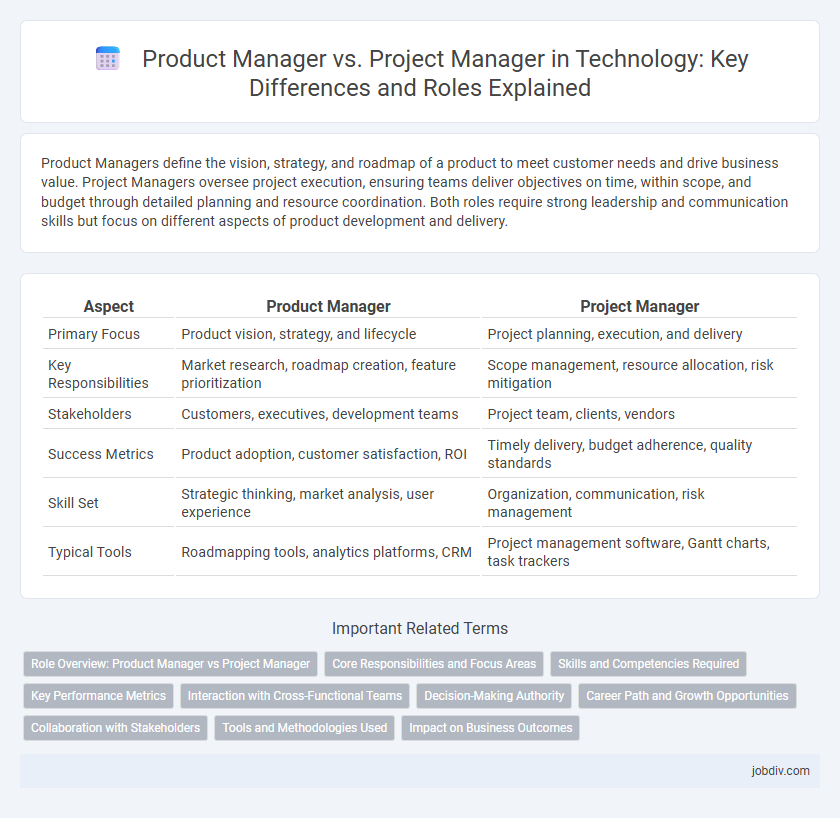Product Managers define the vision, strategy, and roadmap of a product to meet customer needs and drive business value. Project Managers oversee project execution, ensuring teams deliver objectives on time, within scope, and budget through detailed planning and resource coordination. Both roles require strong leadership and communication skills but focus on different aspects of product development and delivery.
Table of Comparison
| Aspect | Product Manager | Project Manager |
|---|---|---|
| Primary Focus | Product vision, strategy, and lifecycle | Project planning, execution, and delivery |
| Key Responsibilities | Market research, roadmap creation, feature prioritization | Scope management, resource allocation, risk mitigation |
| Stakeholders | Customers, executives, development teams | Project team, clients, vendors |
| Success Metrics | Product adoption, customer satisfaction, ROI | Timely delivery, budget adherence, quality standards |
| Skill Set | Strategic thinking, market analysis, user experience | Organization, communication, risk management |
| Typical Tools | Roadmapping tools, analytics platforms, CRM | Project management software, Gantt charts, task trackers |
Role Overview: Product Manager vs Project Manager
A Product Manager drives the vision, strategy, and lifecycle of a product, ensuring alignment with customer needs and business goals through market research and feature prioritization. A Project Manager coordinates resources, timelines, and deliverables to execute specific projects efficiently, emphasizing scope, budget control, and risk management. Both roles require strong leadership and communication skills but differ fundamentally in focus: product innovation versus project execution.
Core Responsibilities and Focus Areas
Product Managers prioritize defining product vision, user experience, and market strategy to drive product development aligned with customer needs and business goals. Project Managers concentrate on planning, executing, and closing projects by managing resources, timelines, and budgets to ensure successful delivery within scope. The core distinction lies in Product Managers focusing on product lifecycle and value creation, while Project Managers emphasize process management and operational execution.
Skills and Competencies Required
Product Managers require strong skills in market research, user experience design, and strategic planning to define product vision and prioritize features. Project Managers excel in competencies like resource allocation, risk management, and scheduling to ensure timely delivery within scope and budget. Both roles demand exceptional communication and leadership abilities to coordinate cross-functional teams and drive project or product success.
Key Performance Metrics
Product Managers focus on metrics such as customer retention rate, product adoption, and feature usage to measure the success of the product lifecycle. Project Managers prioritize on-time delivery, budget adherence, and resource utilization to ensure project execution efficiency. Both roles require data-driven decision-making to align outcomes with organizational goals, but their key performance indicators reflect distinct responsibilities.
Interaction with Cross-Functional Teams
Product Managers drive product strategy by aligning cross-functional teams such as engineering, design, and marketing to deliver customer-centric solutions. Project Managers coordinate timelines, resources, and communication among diverse teams including development, QA, and operations to ensure efficient project execution. Both roles require close collaboration with stakeholders to balance scope, priorities, and deliverables within agile environments.
Decision-Making Authority
Product Managers have strategic decision-making authority focused on defining product vision, prioritizing features, and aligning stakeholder needs with market demands. Project Managers hold operational decision-making authority, managing timelines, resources, and team coordination to ensure project delivery within scope and budget. The distinct decision-making scopes highlight Product Managers guiding the product lifecycle, while Project Managers oversee execution processes.
Career Path and Growth Opportunities
Product Managers progress by deepening expertise in market analysis, user experience, and product lifecycle management, leading to roles like Chief Product Officer or Head of Product. Project Managers develop skills in resource allocation, risk management, and stakeholder communication, advancing toward Program Manager or PMO Director positions. Both career paths offer leadership opportunities but differ in focus: Product Managers align closely with business strategy and innovation, while Project Managers concentrate on execution and delivery efficiency.
Collaboration with Stakeholders
Product Managers align product vision with customer needs by collaborating closely with stakeholders such as developers, designers, and marketing teams to ensure feature prioritization and market fit. Project Managers facilitate stakeholder communication, manage timelines, and mitigate risks to keep projects on track within scope and budget. Both roles require strong interpersonal skills to synchronize efforts across cross-functional teams and deliver successful technology solutions.
Tools and Methodologies Used
Product Managers typically utilize tools like roadmapping software (e.g., Aha!, Productboard) and analytics platforms (e.g., Mixpanel, Amplitude) to track user feedback and prioritize features, applying agile methodologies such as Scrum and Lean Startup for iterative development. Project Managers rely heavily on project planning tools like Microsoft Project, Jira, and Trello to manage timelines, resources, and tasks, often employing methodologies including Waterfall, Agile, and PMI's PMBOK framework to ensure project delivery within scope and budget. Both roles require collaboration tools like Slack and Confluence but differ in the strategic versus execution focus of their toolsets and processes.
Impact on Business Outcomes
Product Managers drive business outcomes by defining product vision, prioritizing features based on customer needs, and aligning development with market demands to maximize ROI. Project Managers ensure timely delivery, budget adherence, and efficient resource allocation, directly impacting operational efficiency and risk mitigation. Together, their roles complement each other to optimize product success and organizational profitability.
Product Manager vs Project Manager Infographic

 jobdiv.com
jobdiv.com